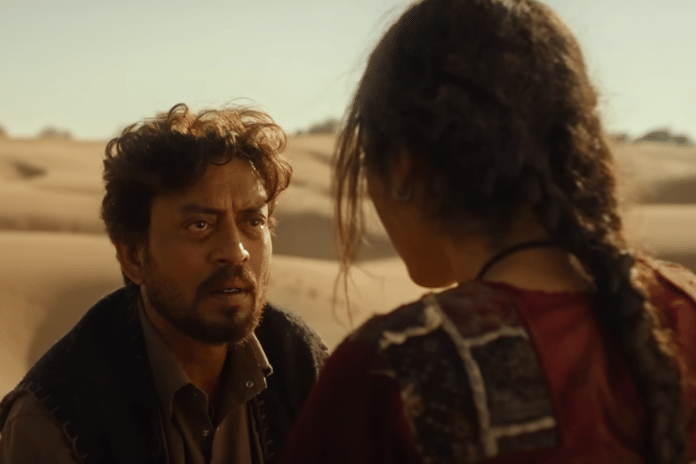In 2001, a little over a decade after his Bollywood acting debut in Salaam Bombay, Irrfan Khan made himself known to international audiences and film critics for the first time by collaborating with British director Asif Kapadia and distributor Film4 to produce The Warrior.
An 86-minute brute of a film shot largely in Rajasthan and centred on a tyrant played by Irrfan, The Warrior marked a winning debut for Kapadia and played its part in making the actor a household name for those outside India largely unfamiliar with most of the Hindi film industry.
Over two decades later, on his third death anniversary, Irrfan posthumously returns to the Rajasthani setting that launched the globetrotting phase of his acting career. This time, he has collaborated for the second time with Swiss director Anup Singh for The Song of Scorpions. They had previously worked together on Qissa in 2013.
The Song of Scorpions was filmed around Jaisalmer in late 2015 and premiered at the Locarno Film Festival in August 2017 before entering almost six years of distributor hell in finding a theatrical release in India — American audiences have been able to stream it via Amazon’s Freevee (formerly iMDb TV) since 2021.
Perhaps this was meant to be as on paper — the rural Thar desert areas represent a full circle of sorts, encapsulating Irrfan’s career in independent cinema, far removed from mainstream Mumbai life.
Passing of the torch
In terms of actual screen time, however, his camel-trading character Aadam, who is one of two looming figures over the poster, actually takes more of a back seat. The real star of The Song of the Scorpions is the Iranian-French actress Golshifteh Farahani, who plays the titular scorpion-singer Nooran.
Foreign and Indian film critics alike have questioned why an accomplished Indian actress like Tillotama Shome, who cameos in this film and co-starred with Irrfan in Qissa, wasn’t chosen for such a role.
But Farahani puts to rest any doubts of being a seemingly out-of-place foreigner by very nearly nailing the Rajasthani dialect to a T and captivating the viewer at every turn. She completely immerses herself in Nooran, who goes from being a traditional healer of scorpion stings under the tutelage of her grandmother (Waheeda Rahman) to attempting to rebuild her life following a traumatic night.
This should come as no surprise to anyone even remotely familiar with her long career in Iranian and international cinema since the 2000s. But the timing of this production’s release, and the masterful chemistry between Aadam and Nooran, almost feels like a passing of the torch from Irrfan to Golshifteh.
Young talent in frame
As such, Indian audiences can now be belatedly introduced to a slightly younger generational talent of the independent scene who is otherwise relegated to generic supporting roles in more mainstream works like Extraction (2020).
Waheeda Rahman, Shashank Arora, Kritika Pande, and Sara Arjun — all perform as brilliantly as Irrfan in their respective roles and interactions over the course of the film as well, showing the on-point casting choices made by Anup Singh and the rest of his Swiss production crew.
Apart from the acting, the film’s biggest strengths lie in the art of direction, cinematography, and music direction that drives Nooran’s singing. They are all well-layered in capturing the beauty, brutality, and bleakness of the setting. But underneath these complex textures lies a script that is far too simplistic and thematically clichèd than what this cast and crew deserved.
It’s not as much of a missed opportunity toward the region as Netflix’s Thar was, but Anup’s failure to provide deeper insights on the forces behind the central plot prevents this meticulously made labour of love from approaching the kind of powerful gendered nuance seen in the likes of Abhishek Chaubey’s Sonchiriya.
Moreover, the film’s Indian distributors have been their own worst enemy in making it as accessible as possible to Indian audiences by failing to add subtitles and make the regional Rajasthani dialect easier to understand, especially when international screenings and US streaming releases come with such subtitles.
Many critics will continue to view The Song of Scorpions as primarily a movie for the Irrfan Khan superfans and completionists, but such a view does not do justice to a film that serves as a fitting, if flawed, farewell to a legend.
(Edited by Humra Laeeq)






